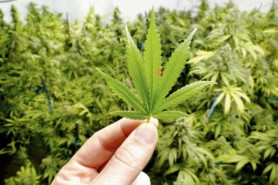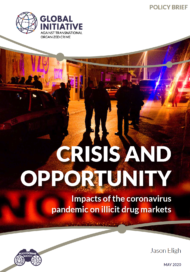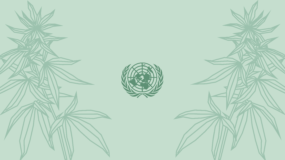Posted on 20 Nov 2020
The legalization of cannabis markets in several countries provides a natural experiment to test how illicit economies and organized crime may adapt to the regulatory changes.
Cannabis laws around the world are changing. Medical cannabis has now become an international business, with many publicly traded companies operating in this industry, while exchange traded funds even allow investors to speculate with a diversified basket of cannabis stocks. Meanwhile, the legal recreational cannabis market looks set to consolidate its momentum. Uruguay, Canada and 15 US states openly and transparently regulate the supply of licit cannabis for recreational use. The Biden–Harris Democratic administration seems likely to push some federal legislative change to remove the disconnect between state and federal laws. Meanwhile, other countries, despite having to balance complex domestic politics and an uneasy relationship between cannabis legalization and international law, are edging gently towards regulating their recreational markets.
There are two realities that now seem inescapable. First, cannabis legalization for recreational consumption is no longer a hypothetical policy or the subject of personal normative judgements. It exists, is politically embedded and is expanding globally. Secondly, changing national regulations around cannabis have significant implications for the transnational drug control system. These issues are the focus of an important, open-access symposium issue of the American Journal of International Law Unbound, titled ‘Drug decriminalization, legalization, and international law’. The issues raised by cannabis legalization resonate far beyond drug-control debates. They raise important questions for the evolution of international legal regimes and how these interact with domestic politics and laws. Moreover, the natural experiment that cannabis legalization provides will shine a light on key questions of transnational organized crime, particularly how markets will adapt to radically changed regulatory structures.
My paper, ‘A brief history of cannabis and the drug conventions’, addresses the history of international cannabis regulations since the 19th century. It highlights some key inflection points from British colonial policies in Burma and India to the birth of US federal legislation. It does not concern itself solely with the history of cannabis, but uses its trajectory over time to highlight international regime complexity, legal contingency, cross currents of national agency and interests, and suggests future trends for international drug control. It also serves to challenge some orthodox assumptions that have arguably constrained thinking about how the international drug institutions have evolved in the past and might develop in the future.
The paper makes a number of observations. First, although drugs have been regulated at the international level for over a century, the boundaries between licit and illicit, prohibited and regulated, are less clear-cut than many policy discussions recognize. As the official commentaries to the UN drug conventions repeatedly highlight, international law left prohibition to the judgement, though theoretically not to the discretion, of each party. The relationship between regulations and prohibitions has been a dialectical and evolutionary process, characterized by legal ambiguities and changing norms. These grey areas have given rise to degrees of flexibility of interpretation in how countries have adopted, implemented – and now reform – their relationship to the international drug-control system. These flexibilities are also the broad entry points by which parallel and intersecting regimes, such as the environment, sustainable development and human rights, coalesce within global governance frameworks. They make it possible for competing and at times conflicting transnational legal and regulatory systems to co-exist, interact and thereby develop alongside one another. As I write in the paper, all of these realities de-emphasize the idea of prohibition:
‘[The treaty system] was not just about prohibition. It was fundamentally about regulation and reciprocity of controls. The imposition of unequivocal prohibitions is virtually absent from the conventions, except in broad and ill-defined terms resting under national prerogatives.’
Secondly, the system was first and foremost about opiate regulation, with its core elements roughly transposed onto cannabis. This produced various areas of contradiction and overlaps, which are outlined in the official commentaries to the conventions. Thirdly, orthodox conceptions of drug control tend to view it as a unilaterally imposed US hegemonic creation. Historiography has widely demonstrated this viewpoint as inaccurate and shows that it ultimately helps obscure the key role of various national interests around the world in developing and implementing the system in its current form. As the article argues, ‘states and reformers must look inwards to the elite politics, modernization assumptions and indeed racist and classist underpinnings of national policy choices’.
This paper serves as a brief overview of deeper and more complex issues facing the international community as it navigates the latest developments in the international drug-control system, and indeed multilateral cooperation more broadly. Although cannabis poses significant challenges to the status quo of transnational legal cooperation, these are not unprecedented, nor are they insurmountable. As I argue, cannabis reform is not prevented by the transnational drug-control system, and a functionalist and ‘more flexible international system which both allows and provides a check upon divergent national cannabis policies is likely the best way to protect global health and welfare’.
Changing cannabis laws are fraught with problems, but also possibilities, for multilateralism. The legalization of a previously illicit market provides a natural experiment for understanding how illicit economies and organized crime adapt to regulatory changes. We should be prepared for many unpredicted outcomes, which will provide insights into potential regulatory changes around other criminal economies, such as other drug markets, wildlife and illicit financial flows, to name a few. How criminal organizations adapt to these changed regulations will also determine the net social welfare gains and losses that come with legalization. And while individual jurisdictions are increasingly concluding that the costs of prohibition are much greater than the net costs of legalization, international regulations are still necessary and likely to continue. As the paper concludes, ‘[I]n the long run, evidence of efficacy is the best inoculation against bad policies. A more flexible international system which both allows and provides a check upon divergent national cannabis policies is likely the best way to protect global health and welfare’. Here, there are important lessons to be learnt when it comes to the regulation of other global illicit markets.



